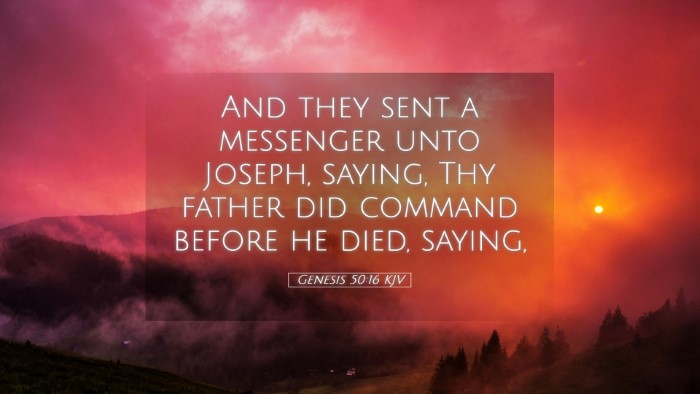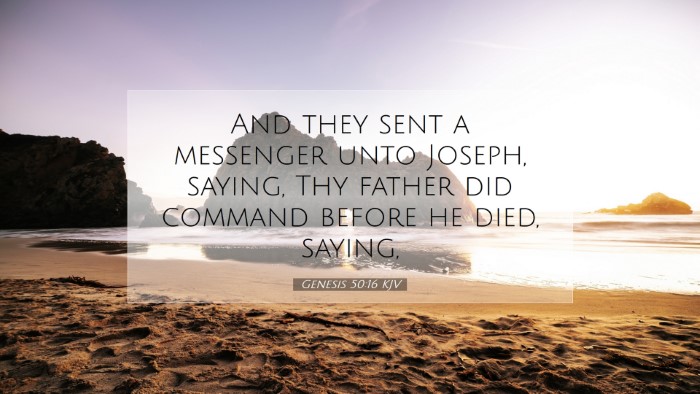Commentary on Genesis 50:16
Genesis 50:16 states: “And they sent a messenger unto Joseph, saying, Thy father did command before he died, saying, Take heed to yourselves, that ye speak not unto Joseph evil, as the brothers of Joseph sought to explain their past actions and seek his forgiveness. This verse encapsulates critical themes of reconciliation, guilt, and familial dynamics.
Contextual Background
This verse appears at the conclusion of the Book of Genesis, a narrative filled with the intricacies of the human condition. After Jacob's death, Joseph's brothers feared that Joseph, who had risen to power in Egypt, would seek vengeance against them for their earlier betrayal. Their anxiety reflects a deep-seated guilt and unease that demands reflection.
Insights from Public Domain Commentaries
Matthew Henry's Commentary
Matthew Henry emphasizes the significance of the message sent by Joseph’s brothers. He notes that they acted out of fear, believing that Joseph harbored resentment toward them. Henry points out the brothers’ acute awareness of their past sins, which implies that the conscience is a potent force that often reminds individuals of their failings.
He further expounds on the notion that the brothers' intentions to convey their father's wishes were aimed at mitigating any potential wrath from Joseph. This reflects a common human tendency to justify actions and seek the protection of familial ties to shield oneself from past misdeeds.
Albert Barnes' Commentary
Albert Barnes provides a detailed exposition of this verse, noting the dubious nature of the message relayed by the brothers. He argues that their claim that Jacob commanded them to seek Joseph’s forgiveness may not have been genuine but rather a strategy devised to garner Joseph's mercy. This action illustrates how guilt can compel individuals to manipulate situations to alleviate their fears.
Barnes also indicates the psychological elements at play, as the brothers' actions underscore a lack of trust in Joseph's intentions despite their prior reconciliation. This skepticism may stem from their lingering guilt over their wrongdoing, highlighting the complex relationships within families.
Adam Clarke's Commentary
Adam Clarke examines the implications of the brothers' message from a theological perspective. He suggests that their appeal ignored Joseph's previous acts of forgiveness and grace, illustrating the nuanced struggle between past sins and the hope for future reconciliation. Clarke notes that this episode serves to remind readers of God's mercy toward humanity, reflected in Joseph's eventual response.
Moreover, Clarke delves into the emotional dynamics that arise during familial conflicts and the lasting impacts of guilt. His analysis emphasizes the importance of genuine contrition and reconciliation in the healing process, portraying Joseph’s perspective as pivotal for understanding forgiveness.
Thematic Considerations
- Fear and Guilt: The brothers' fears demonstrate how guilt can distort relationships. Their actions serve as a powerful reminder of how past wrongs can haunt individuals and affect their behavior, even after forgiveness has been extended.
- Reconciliation: Joseph’s previous acts of mercy illuminate the grace that can exist within relationships. His response to their plea is indicative of a heart that understands forgiveness, contrasting sharply with the brothers' trepidation.
- Familial Bonds: This passage highlights how familial dynamics can influence behavior. The brothers invoke their father's authority to mitigate the consequences of their actions, underscoring the weight of parental figures in ethical decision-making.
Application for Pastors and Theologians
This passage invites pastoral reflection and theological exploration surrounding forgiveness and reconciliation. For pastors, it serves as a poignant reminder to cultivate an atmosphere of grace within their congregations, encouraging members to seek and extend forgiveness freely.
Theologians might explore the implications of divine forgiveness versus human forgiveness, considering how Joseph's actions reflect a Christ-like magnanimity. The interplay of fear and grace found within this text can fuel deeper discussions on the nature of sin, repentance, and redemption.
Conclusion
Genesis 50:16 encapsulates crucial insights about human nature, the implications of sin, and the transformative power of forgiveness. By understanding Joseph's response through the lens of fear, guilt, and grace, readers can better appreciate the complexities of familial relationships and the profound call to reconciliation that resonates throughout Scripture.


